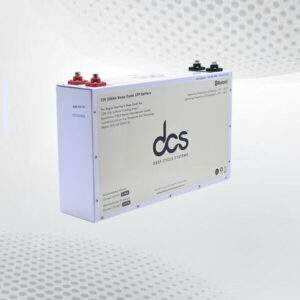A dependable and efficient power storage solution is essential for off-grid adventures, whether camping in a remote wilderness, cruising on a boat, or travelling in an RV. A 12V 75Ah deep cycle battery stands out as a crucial component in these scenarios, offering a reliable source of energy to power various systems and devices. This blog will explore the importance of this battery type, detailing its specifications, reliability, applications, and maintenance practices to help you make the most of your off-grid experiences.
Understanding Deep-Cycle Batteries
Deep-cycle batteries are engineered to deliver sustained power over extended periods, distinguishing them from regular starting batteries. Starting batteries are designed to provide a high burst of energy to start engines, but they are not suitable for continuous use. In contrast, deep-cycle batteries are built to handle frequent and deep discharges, making them ideal for applications where energy needs to be drawn over long durations. This design makes them indispensable for off-grid power systems facing repeated charging and discharging cycles.
The core technology behind deep-cycle batteries typically involves lead-acid or lithium-ion chemistry, each offering distinct advantages. Lead-acid batteries are more traditional and cost-effective, while lithium-ion batteries are newer, with higher energy density and longer lifespans. Understanding the chemistry and design of deep-cycle batteries helps users choose the right type for their specific needs, ensuring they get the most out of their investment.
Specifications of A Deep Cycle Battery 12V 75Ah
The specifications of a 12-volt 75-Ah deep-cycle battery provide crucial insights into its performance and suitability for various applications.
- Voltage Rating: A 12-volt deep-cycle battery provides a nominal voltage of 12 volts, which is standard for most off-grid systems. This voltage rating ensures compatibility with a wide range of devices and equipment, including solar power systems, RVs, and marine applications.
- Amp-Hour (Ah) Rating: The 75-Ah rating signifies that the battery can deliver 75 amps of current for one hour or a lower current for more extended. This rating helps determine the battery’s capacity and how long it can power devices before needing a recharge.
- Depth of Discharge (DOD): Deep-cycle batteries are designed to handle frequent and deep discharges. While the deep cycle battery 12V 75Ah can endure discharges down to 20% of its capacity without significant damage, it is recommended to avoid deep discharges regularly to prolong battery life.
- Charge Efficiency: The battery’s charge efficiency indicates how effectively it converts and stores energy during charging. High charge efficiency ensures quicker and more effective recharging, making the battery more practical for off-grid use.
- Cycle Life: The cycle life represents the number of charge-discharge cycles the battery can undergo before its capacity significantly degrades. Depending on usage and maintenance practices, a 12-volt 75-Ah deep-cycle battery typically has a cycle life ranging from 500 to 1,000 cycles.
Reliability of Using Deep-Cycle Batteries
Reliability is a crucial factor when selecting deep-cycle batteries for off-grid applications. These batteries are built to endure the stress of frequent and deep discharges, making them more durable than regular batteries. Their robust construction includes thicker plates and higher-quality materials to withstand the wear and tear of repeated cycling.
Deep-cycle batteries also feature advanced designs to minimize performance degradation over time. For example, deep-cycle batteries include features like reinforced separators and improved electrolyte formulations to enhance lifespan. Their ability to maintain consistent performance even after numerous charge and discharge cycles makes them a dependable choice for off-grid power systems.
Additionally, deep-cycle batteries often come with warranties that reflect their reliability. Manufacturers typically offer warranties ranging from 2 to 5 years, depending on the battery type and brand. A more extended warranty indicates confidence in the battery’s durability and performance, providing users with peace of mind.
Applications of a 12 Volt 75 Amp Deep Cycle Battery
The versatility of a 12-volt 75-Ah deep-cycle battery makes it suitable for a variety of off-grid applications. This battery can power essential systems such as navigation equipment, sonar, and communication devices in marine settings, ensuring safe and enjoyable boating experiences. The ability to handle the frequent charging and discharging cycles typical in marine environments makes it a valuable asset for boaters.
The 12 volt 75 amp deep cycle battery supports a range of appliances and systems in recreational vehicles (RVs), including lights, refrigerators, and entertainment units. This capability enhances the comfort of off-grid travel, allowing RV users to enjoy modern conveniences even when away from conventional power sources.
For remote cabins or homes, a 12-volt 75-Ah deep-cycle battery provides a reliable power source for essential systems like lighting, refrigeration, and water pumps. This battery ensures that users have access to electricity in isolated locations, enabling a functional and comfortable living environment.
Ideal Conditions for Optimal Performance
Operating a 12-volt 75-Ah deep-cycle battery under optimal conditions is essential to maximizing its performance and lifespan. Key factors include temperature management, discharge practices, and charging procedures.
Temperature Management
Deep-cycle batteries perform best within a specific temperature range, typically between 50°F and 77°F (10°C to 25°C). Extreme hot or cold temperatures can adversely affect battery performance and lifespan. In freezing conditions, battery capacity may decrease, while the battery may experience accelerated degradation in hot conditions. To maintain optimal performance, store the battery in a temperature-controlled environment and avoid exposing it to extreme temperatures.
Discharge Practices
Avoid deep discharges whenever possible, as they can reduce the battery’s overall lifespan. Deep discharging occurs when the battery is depleted below 50% of its capacity. Frequent deep discharges can lead to sulfation and reduced battery capacity over time. Instead, aim to keep the battery’s charge level above 20% to prolong its life and maintain its performance.
Charging Procedures
Use a charger specifically designed for deep-cycle batteries, with adjustable settings to match the battery’s specifications. Proper charging ensures that the battery is replenished correctly and efficiently. Overcharging or undercharging can lead to reduced performance and potential damage. Regularly check the battery’s charge level and maintain it within the recommended range for optimal operation.
Benefits of A 75Ah Deep Cycle Marine Battery
A 75-Ah deep-cycle marine battery provides several key benefits, particularly in aquatic environments. Its substantial capacity ensures a reliable and steady power supply for essential marine electronics like GPS systems, sonar, and communication devices. This consistent power delivery is crucial for uninterrupted operation during extended trips.
These batteries are known for their durability and longevity. Designed to endure harsh marine environments, they resist vibration, moisture, and other stresses, contributing to their extended lifespan and reliable performance even in challenging conditions. The deep discharge capability of deep-cycle batteries means they can handle significant discharges without a notable loss in performance.
This feature is particularly beneficial in marine settings where power demands vary, ensuring the 75Ah deep cycle marine battery delivers energy over long durations. Furthermore, many deep-cycle marine batteries offer maintenance-free options. With sealed designs that prevent electrolyte loss, these batteries require less frequent upkeep, allowing users to focus more on enjoying their marine adventures rather than managing battery maintenance.
Maintenance Tips for Prolonging Battery Life
Maintaining a 12-volt 75-Ah deep-cycle battery is crucial to ensure it operates efficiently and lasts for its intended lifespan. Here are some essential maintenance tips to help prolong the life of your battery:
Regularly Check Charge Levels
Monitoring the battery’s charge level is fundamental for maintaining its health. Ideally, you should keep the charge level above 20% to avoid deep discharges, which can shorten the battery’s lifespan. Use a battery monitor or hydrometer to ensure the battery is regularly maintained within its optimal charging range.
Clean Terminals and Connections
Battery terminals and connections can accumulate corrosion, which impedes electrical flow and affects performance. To remove corrosion, periodically clean the terminals with a mixture of baking soda and water.
Secure Battery Mounting
Properly securing the battery in its mount is vital to prevent vibrations and physical damage. Excessive movement can lead to internal damage and decreased battery performance. Ensure the battery is firmly mounted in a stable location to avoid unnecessary wear and tear.
Top-Up Electrolyte Levels
It is essential to regularly check and maintain electrolyte levels for flooded lead-acid batteries. If the levels are low, top them up with distilled water. This prevents the plates from becoming exposed and helps maintain battery performance.
Protect from Extreme Temperatures
Extreme temperatures can adversely affect battery performance and longevity. Store and operate the battery in a temperature-controlled environment to prevent damage from excessive heat or cold. High temperatures can lead to faster degradation while freezing temperatures can reduce capacity and efficiency.
Choosing the Right 75Ah Marine Battery
Selecting the correct 75Ah marine battery involves evaluating various factors to ensure it meets your specific needs. Consider the following aspects when choosing a marine battery:
- Build Quality: Look for batteries designed specifically for marine use, as they are built to withstand the unique conditions of marine environments. High-quality materials and construction ensure durability and reliable performance.
- Capacity and Performance: Evaluate the battery’s capacity and performance specifications to ensure it meets your power requirements. Consider factors such as discharge rates, recharge times, and overall efficiency to choose a battery that provides the desired performance.
- Brand Reputation: Consider reputable brands known for producing reliable marine batteries. Research customer reviews and consult with experts to identify brands with a proven quality and performance track record.
- Warranty: Check the manufacturer’s warranty offerings. A more extended warranty period indicates confidence in the battery’s durability and performance, providing additional peace of mind.
- Expert Advice: Consult with professionals or experts for recommendations tailored to your needs. Their expertise can help you decide on and select a battery that meets your requirements.
Conclusion
A 12-volt 75-Ah deep-cycle battery is essential for off-grid adventures, offering reliable and consistent power for various applications. Its robust design and versatile applications make it a valuable asset for marine, RV, and remote cabin settings. By understanding its specifications, benefits, and maintenance requirements, users can maximize the performance and longevity of their deep-cycle battery, ensuring a dependable energy source for their off-grid experiences.
FAQs
What is a deep-cycle battery, and how is it different from a regular battery?
A deep-cycle battery is designed for sustained energy output over extended periods, unlike regular batteries, which provide high bursts of power for short durations. Due to their ability to withstand frequent discharges and recharges, deep-cycle batteries are ideal for off-grid applications.
How long does a 12V 75Ah deep cycle battery typically last?
The lifespan of a 12V 75Ah deep cycle battery depends on factors such as usage, maintenance, and operating conditions. With proper care, these batteries can last between 3 to 7 years.
Can a 12-volt 75-Ah deep-cycle battery be used in extreme temperatures?
While deep-cycle batteries are designed to handle a range of temperatures, extreme conditions can affect performance. To ensure optimal performance and longevity, keep the battery within the manufacturer’s recommended temperature range.
What type of charger should be used with a 12-volt 75-Ah deep-cycle battery?
Use a charger specifically designed for deep-cycle batteries, preferably with an adjustable charge rate. An appropriate charger will ensure proper charging and prevent damage to the battery.
How can I extend the life of my deep-cycle battery?
To extend the life of your deep-cycle battery, regularly check and maintain its charge level, clean the terminals, avoid deep discharges, and store it in a temperature-controlled environment.
Is it necessary to equalize the battery regularly?
Equalization is recommended for lead-acid deep-cycle batteries to prevent stratification and sulfation. It involves charging the battery at a higher voltage for a short period to balance the cell voltages and extend the battery’s life.




